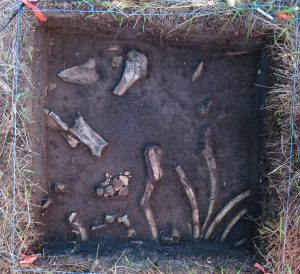NEAR MELITA – Archaeologists from Brandon University (BU) and the Manitoba Archaeological Society (MAS) are continuing their investigation of how Indigenous people lived in southwestern Manitoba before the arrival of Europeans.
Brandon University Department of Anthropology Professor Dr. Mary Malainey and the MAS are working this summer in and around the Olson site, located south of Melita. The site was discovered in 2018 by Mr. Eric Olson, who found scapula hoes (made from bison shoulder blades) along a creek bank. This type of bone tool was used to cultivate maize crops. The Olson site is on Treaty 2 lands, which are the traditional homelands of the Dakota, Anishanabek, Ojibway-Cree, Cree, Dene and Metis peoples. Ms. Amber Flett, the team’s Indigenous Engagement Liaison, has contacted First Nations communities in the region about the project.

(Photo by Alicia Gooden)
Initial testing of the site began in 2019. Excavations in 2020 uncovered modified bones of bison, deer, wolf, beaver and goose. A cluster of modified bison ribs and fragments of a modified scapula confirm the area was once a bone tool-making workshop.
New grants are helping to underwrite further investigation of the site this year, which is at risk. It is hoped that COVID health protocols — as well as the weather — will allow the public to visit the site over the August long weekend.
“The densest concentration of modified bone is in a part of the floodplain being eroded away by the creek. We hope to recover as much information as possible before it is lost. This is only the second time well-preserved bison scapula hoes have been found in Manitoba. The Olson site is a very special place and we have the opportunity to learn a great deal about these Indigenous farmers.”
The research team also includes Dr. Sara Halwas (Anthropology, University of Manitoba), Ms. Alicia Gooden (MAS President), and other professional archaeologists from the MAS. The team members and archaeology students will continue the excavation of the bone tool-making workshop and begin testing anomalies on the prairie level detected last year. Some of the subsurface anomalies could represent the former dwellings of the Indigenous farmers and their crop storage pits. Dr. Dion Wiseman (Geography, Brandon University) is conducting a RTK survey to map the distribution of archaeological recoveries throughout the valley and collecting UAV imagery to survey the area.
“In other parts of the Northeastern Plains, Indigenous farmers planted crops in the valley and constructed their homes on the high ground. This could be what happened here as well. Crop storage pits were identified on the prairie level a few kilometres to the east. Based on the distribution of the anomalies, the Olson site farmers may have lived in small farmsteads. There is no evidence of fortified pre-contact horticultural villages in Manitoba.”
The Manitoba Heritage Grants Program is providing $10,000 to Dr. Malainey and $8,512 to the Manitoba Archaeological Society to carry out the research. The MAS ($6,500) is also funding the project. A BU/BU Student Union Work Study Grant and funds from the Canada Summer Jobs program will enable Dr. Malainey to hire student field and lab assistants.
Weather and COVID-19 health protocols permitting, public archaeology site tours will be held from July 30 to August 2 at 10 a.m. and 12 noon. Events will conform to group size restrictions and physical distancing protocols. Interested individuals will have the opportunity to help archaeologists excavate the site (while wearing their facemasks). Information will be posted on the Manitoba Archaeological Society website and Facebook pages in the coming days.
Contact
- Brandon University
- communications@brandonu.ca
To receive any BU publication in an alternate format please contact Communications@BrandonU.ca
About BU
Success is built at Brandon University. Our growing, progressive campus welcomes a diverse and inclusive community that combines proud tradition with shared ambition. Through our excellence in teaching, research, and scholarship, we educate students to make a meaningful difference as engaged citizens and leaders. Join us at BrandonU.ca.